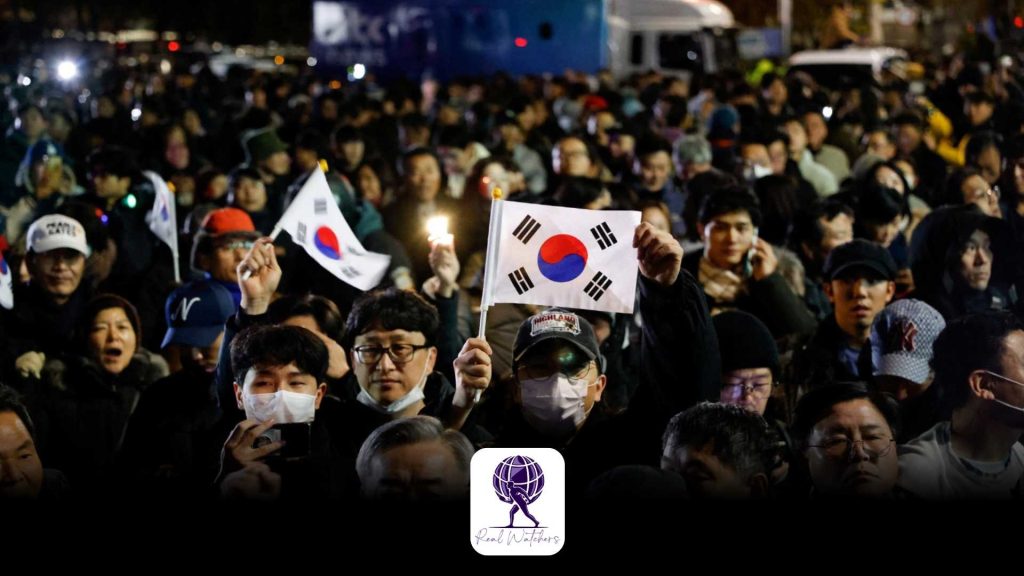South Korean President Yoon Suk Yeol is under increasing scrutiny as calls for his resignation grow following his unsuccessful bid to implement martial law. Meanwhile, parliament is advancing towards a vote on his impeachment.
Seoul, the capital of South Korea, has witnessed a second consecutive day of street protests calling for President Yoon’s resignation, as police announced that he is under investigation for allegations of “insurrection.”
The opposition is advocating for a vote on the motion to impeach President Yoon this Saturday despite the president’s party expressing opposition to the initiative.
For the motion to pass with a two-thirds majority in the 300-seat parliament, a minimum of eight members from Yoon’s party must cast their votes in favour of his impeachment.
Late on Tuesday night, South Korea was in political upheaval following President Yoon’s unexpected declaration of martial law.
He referenced dangers posed by “anti-state forces” as well as North Korea. It quickly became evident that his decision was driven not by external pressures but rather by challenges within his political landscape.
Yoon rescinded the declaration six hours after MPs rejected it in a decisive vote. In a dramatic turn of events, several lawmakers breached barricades and fences, navigating past security forces to gather in parliament to nullify Yoon’s decree.
The imposition of martial law has sparked public outrage and triggered widespread street protests. Since revoking his decision early on Wednesday, he has remained silent in public forums.
Before his efforts to impose military governance, Yoon faced significant challenges, including dwindling approval ratings, accusations of corruption, and a legislature dominated by the opposition that rendered him largely ineffective as a leader.
Additional protests against Yoon are scheduled to occur in Seoul later on Thursday. Anticipation surrounds increased participation as individuals are likely to join in following their work or school commitments. Supporters have organised rallies in his favour; however, these gatherings have drawn significantly smaller crowds.
Several lawmakers are positioned close to the National Assembly, prepared to counter any potential attempt by Yoon to impose another martial law decree.
Authorities have initiated an investigation into Yoon for purported insurrection, prompted by a complaint from the opposition, according to Woo Jong-soo, the head of the National Investigation Headquarters of the National Police Agency. Insurrection carries the ultimate penalty of death and surpasses the protections afforded by presidential immunity.
On Thursday, the National Assembly initiated an investigation into the declaration of martial law.
Opposition Democratic Party lawmaker Kim Seung-won expressed that the declaration of emergency martial law by the Yoon Suk Yeol administration has led to significant confusion and fear within the populace.
On Thursday, Kim Yong-hyun, the defence minister under Yoon, announced his resignation, accepting full responsibility for the declaration of martial law.
During a parliamentary hearing, Interior Minister Lee Sang-min revealed that Kim proposed the idea of martial law to Yoon. South Korean media outlets have circulated reports of a similar nature.
During the hearing, there was a need for more awareness regarding Yoon’s plan. Vice Defence Minister Kim Seon-ho revealed that he became aware of the situation through news reports.
Army chief Park An-su revealed that he received the text of the martial law notice just on Tuesday night.
Four individuals participated in the review of the draft… Although we possess extensive knowledge in military matters, our expertise does not extend to martial law. As time continued to elapse, he recounted the collective sentiment of uncertainty to MPs, stating, ‘What are we to do, what are we to do?’
On Wednesday, parliament officially presented a motion to impeach President Yoon. According to South Korean law, this motion must be voted on within a 72-hour.
The Democratic Party, the primary opposition, is advocating for a vote scheduled for Saturday evening.
Should the impeachment receive approval, the president will face immediate suspension from office, with the prime minister stepping in as acting president.
A trial is set to occur before the Constitutional Court, which comprises nine members responsible for overseeing the various branches of government in South Korea. The timeline for the process may extend to as long as 180 days.
A decision by six court members to uphold the impeachment would result in the president’s removal from office.








